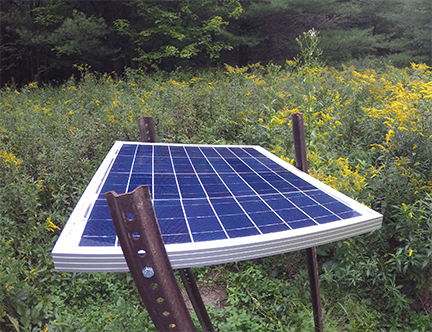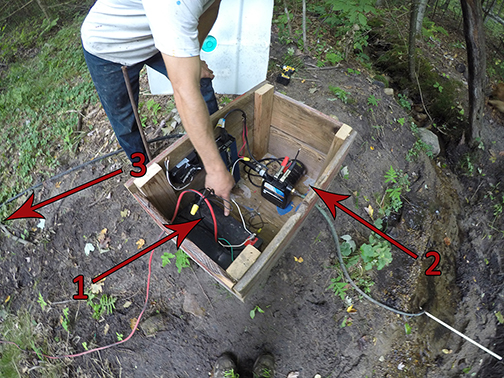
Adirondack Farm Tackles Climate Challenges with Home-Grown Solutions.
By Emily Liebelt, Clarence Petty Intern
In this season of drought, Dillon Klepetar of Echo Farm and Farmstead Catering in Essex frequently sees well-drillers pass by his farm in their trucks, hurrying to service wells that have run dry. Essex County residents are all feeling effects from the inadequate rainfall and some have even taken measures to ration water. Adapting to such climate challenges is a top priority for everyone who grows and eats food in the region. Working with what the land offers and sourcing energy directly from the farm is what Klepetar, and many others, believe is the answer to climate resiliency and self-sufficiency.

Even on drizzly days, Echo Farm's watering system
works for farmers and livestock.
Echo Farm seems to have solved the problem of providing their organic, pasture-raised hogs and chickens with plenty of fresh water during a drought, while also reducing the amount of time and energy required to do so. With a grant from the Adirondack Council and Klipper Fund’s “Cool Farms/Healthy Park” program, and some ingenuity, Klepetar has developed a solar powered pump and gravity fed watering system. The key to the system’s success in efficiency and farm benefits is how it’s integrated with the Adirondack landscape.
A spring feeding a small stream is a reliable source of clean water, even when tested by drought. The 30 kW solar panel is converted into DC power, which runs the pump apparatus to transport water uphill to fill a 400 gallon holding tank. It will run even if the sunshine has been sporadic because the large battery holding the charge only has to be used once per week to fill the tank. Thanks to the topography of Echo Farm, the water lines running downhill from the tank to the animals are gravity fed and require no additional power or human effort. The hogs even have access to on-demand water; they quickly learned how to push a special lever on their water bucket for a gush of spring water. No more hauling buckets, and no more worry about having enough water for the animals. Having a holding tank with enough stored water means the animals can drink for a few days even if the spring isn’t running or the system needs a repair.

1) Solar power is converted to DC and charges the battery.
2) Water is pumped from the stream.
3) Water flows to the holding tank.
Klepetar intends to share his plans for the solar powered watering system with other farmers. Through the process of finding the right components and assembling it himself, he’s learned how to make it as cost effective and user-friendly as possible. Sharing information like this is important for a farming economy like those in Essex County and the Adirondack Park which focus on collaboration rather than competition. Making improvements to the sustainability of one farm has positive rippling effects to the rest of the community, and reducing emissions benefits all life on Earth.
Of course, there’s more to farming than finding water, so Echo farm isn’t stopping there. Klepetar is passionate about incorporating as much renewable energy and local resources into his farm and business as possible. Since they use a tractor for big jobs and animal butchering, they need diesel fuel. But what if they already had a source of fuel growing right on the farm? Lard-powered tractors could be the next big move toward sustainability. That’s right, fuel made from the fat of a pig. Klepetar mentioned how most animal butchering facilities just throw away that part of the animal when the meat is removed, wasting up to hundreds of pounds per day.
Instead, they could include it in the list of products rendered from livestock and use it to produce locally-grown, clean-burning biofuel. Utilizing this source of energy rather than tossing it could potentially run every tractor in Essex County. With a few modifications to his equipment, Klepetar sees biofuel as a possibility for his farm and others who believe in burning pollution-free fuel.
|
|||





